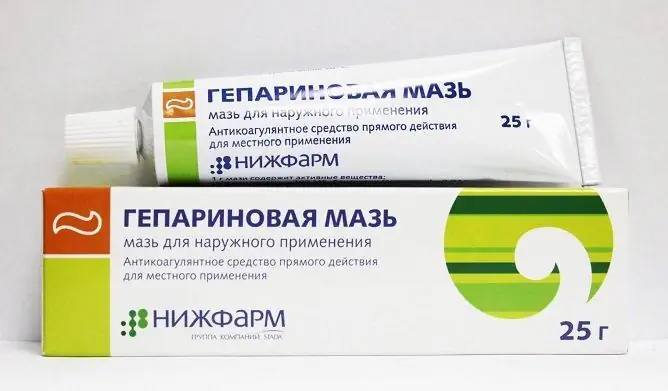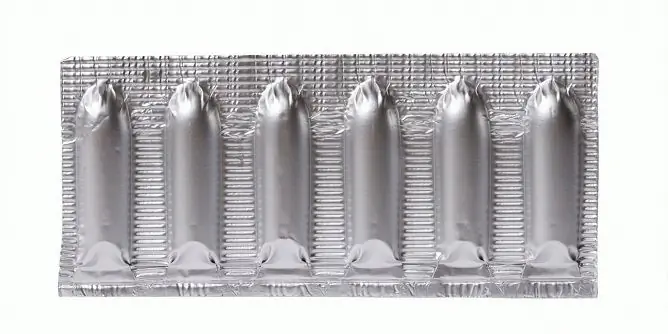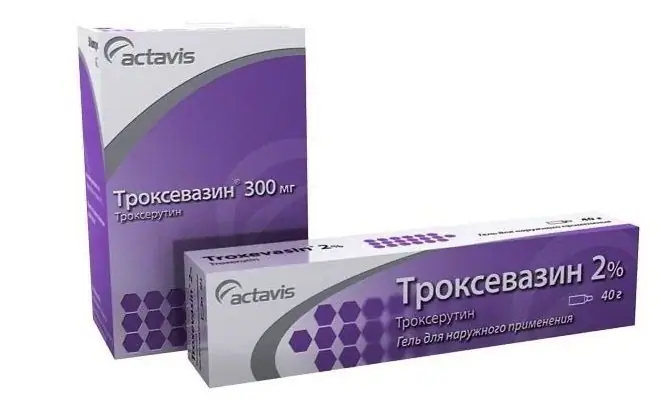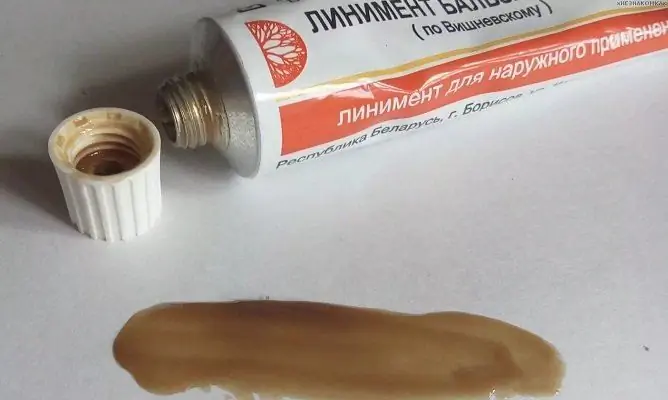- Author Rachel Wainwright wainwright@abchealthonline.com.
- Public 2023-12-15 07:39.
- Last modified 2025-11-02 20:14.
Heparin ointment for hemorrhoids: reviews, how to use, what helps
The content of the article:
- What does Heparin Ointment help with?
- How to use heparin ointment for hemorrhoids
- Side effects
Heparin ointment for hemorrhoids, according to doctors and patients, is highly effective and safe. Heparin ointment has been used in clinical practice since the middle of the 20th century and has not yet lost its leading position in the list of antihemorrhoidal agents.
Hemorrhoids is a chronic disease that requires long-term and competent therapy. Refusal from it or self-medication threaten the development of severe complications, which often require surgical intervention.

Heparin ointment for hemorrhoids provides a good therapeutic effect
Heparin ointment quickly relieves inflammation, relieves pain and itching. It can be used during pregnancy and breastfeeding.
What does Heparin Ointment help with?
The active active ingredients of heparin ointment are:
- heparin - a direct anticoagulant, reduces the aggregation (sticking) of platelets, as a result of which the risk of blood clots is reduced;
- benzyl nicotinate - a derivative of nicotinic acid, causes expansion of subcutaneous capillaries, which improves the absorption of heparin;
- benzocaine is a local anesthetic that helps to quickly relieve pain, itching, and burning.
In the instructions for use, indications for the use of heparin ointment are called, among others, the following diseases:
- acute hemorrhoids or exacerbation of the chronic form of the disease;
- acute hemorrhoids after childbirth;
- thrombophlebitis;
- traumatic injury.
Heparin ointment for hemorrhoids provides a pronounced therapeutic effect, eliminating the main symptoms of the disease (inflammation, pain, tissue swelling) and contributes to the rapid improvement of patients' condition.
Since the ointment is used for local treatment, it does not have a systemic effect on the body, therefore it is also prescribed for nursing mothers.
Nevertheless, like any other drug, Heparin ointment also has a number of contraindications:
- decreased blood clotting;
- bleeding from hemorrhoids;
- open wounds at the site of application;
- menstruation;
- individual intolerance to the components of the ointment;
- peptic ulcer of the stomach and duodenum;
- cirrhosis of the liver;
- arterial hypertension.
Heparin ointment during pregnancy with hemorrhoids is used only as directed by a doctor.
How to use heparin ointment for hemorrhoids
Before using the ointment, it is necessary to conduct a thorough toilet of the anogenital area.
With external hemorrhoids, approximately 1 g of the drug is squeezed out of the tube and gently rubbed (avoiding rough and pressing movements) into the area around the anus until completely absorbed. Heparin ointment should be applied 2-3 times a day, this is enough to ensure the achievement of a therapeutic effect. With more frequent use of the ointment, the risk of side effects, including bleeding, increases sharply.
Can this ointment be used against internal hemorrhoids? Experts answer in the affirmative, but in this case, the agent must be injected directly into the rectum. This can be done in two ways:
- Finger method. After carrying out hygiene procedures, 1-2 g of ointment is squeezed out of the tube on the finger and very carefully inserted into the anus. At the same time, the nails should be cut short, otherwise a disposable medical glove or fingertip is used.
- Tampon insertion. A small cotton-gauze swab is made. Lubricate its surface with ointment. The patient lies on his left side, pulling his knees up to his stomach. The tampon is carefully inserted into the anus for no more than ½ the length and left for 15-20 minutes, after which it is removed.
The duration of the course of treatment with heparin ointment is determined by the doctor. On average, it is 3-7 days.
In the pharmacy, you can also buy heparin suppositories for hemorrhoids (Gepatrombin G, Nigepan). You can read about how to use them in the package insert for each drug.
Side effects
Despite the fact that Heparin ointment for hemorrhoids has reviews from both patients and doctors mostly positive, its use in rare cases may be accompanied by side effects:
- increased itching;
- redness and irritation of the mucous membrane;
- hives.
Such reactions are caused by an allergy to the drug. In order to prevent them, before the first use of heparin ointment, a small amount (no more than a pea) should be applied to the skin in the elbow bend area. If after two hours at the site of application there is no redness, itching, rash, then the ointment can be used to treat hemorrhoids. Otherwise, its use is contraindicated and the patient should consult a doctor to correct the prescribed therapy.

For internal hemorrhoids, instead of Heparin ointment, suppositories containing heparin can be used
Despite the positive reviews and the proven effectiveness of heparin ointment for hemorrhoids, it should be remembered that self-medication always carries a high risk of serious complications. Only a proctologist, based on the results of the examination and examination data, can tell how to treat hemorrhoids correctly, based on the patient's individual indications. What is useful in one case can lead to a worsening of the condition in another. So, heparin ointment is prescribed when the risk of blood clots in hemorrhoidal cones is high. If, on the contrary, the patient has bleeding of the nodes, heparin is contraindicated for him. In this case, most likely, the doctor will prescribe a drug with an effect opposite to heparin, that is, hemostatic.
YouTube video related to the article:

Elena Minkina Doctor anesthesiologist-resuscitator About the author
Education: graduated from the Tashkent State Medical Institute, specializing in general medicine in 1991. Repeatedly passed refresher courses.
Work experience: anesthesiologist-resuscitator of the city maternity complex, resuscitator of the hemodialysis department.
Found a mistake in the text? Select it and press Ctrl + Enter.






